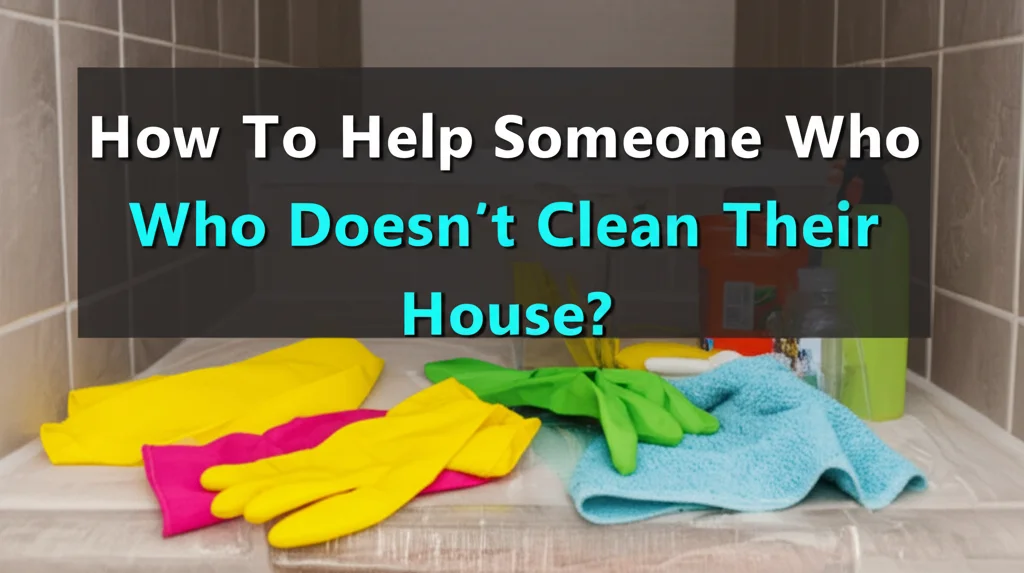· Home & Lifestyle · 7 min read
How To Get A Slob To Clean Up?

How To Get A Slob To Clean Up?
Is your living space constantly battling clutter? Do you feel like you’re the only one lifting a finger to maintain a clean home? You’re not alone. Dealing with someone who consistently avoids cleaning can be incredibly frustrating. This article will provide practical strategies to motivate a “slob” to clean up, turning a messy situation into a more manageable and harmonious living environment. We’ll explore understanding the root causes, communication techniques, and actionable steps to encourage a change.
Here’s a quick answer: Getting a slob to clean up requires understanding why they avoid cleaning, communicating your needs clearly and respectfully, and establishing a fair chore system with clear expectations and consequences. Focus on collaboration, not confrontation, and celebrate small victories.
Takeaway: Motivating someone to clean isn’t about nagging; it’s about understanding, communication, and creating a system that works for everyone involved.
Understanding the “Slob” Mentality
Before diving into solutions, it’s crucial to understand why someone might avoid cleaning. Labeling someone a “slob” is unhelpful and often inaccurate. There are underlying reasons for their behavior, and addressing these is the first step. It’s rarely about laziness; it’s often about different priorities, overwhelm, or even underlying mental health concerns. Understanding these reasons will help you approach the situation with empathy and find effective solutions.
- Different Standards: Their definition of “clean” might be vastly different from yours. What you consider messy, they might see as perfectly acceptable.
- Overwhelm: A large mess can feel insurmountable. They might not know where to start, leading to avoidance.
- Time Management: They may genuinely struggle with time management and prioritize other activities.
- ADHD or Executive Dysfunction: These conditions can make it difficult to initiate and complete tasks, including cleaning.
- Emotional Connection to Clutter: Sometimes, items hold sentimental value, making it hard to discard them.
The Art of Communication: Talking Without Accusation
Directly accusing someone of being a “slob” will likely lead to defensiveness and resentment. Instead, focus on how their messiness affects you. Use “I” statements to express your feelings and needs without placing blame. This approach fosters a more constructive conversation. Remember, the goal is to find a solution, not to win an argument.
- Focus on Feelings: Instead of saying “You’re so messy!”, try “I feel stressed when the kitchen is cluttered because it makes it hard for me to cook.”
- Be Specific: Instead of “Clean up your mess,” say “Could you please wash the dishes and wipe down the counters?”
- Active Listening: Truly listen to their perspective. Ask them why they struggle with cleaning and acknowledge their feelings.
- Avoid Nagging: Constant reminders will only create tension. Have a conversation, establish a plan, and then follow up respectfully.
- Choose the Right Time: Don’t bring up the issue when you’re already frustrated or when they’re busy.
Creating a Chore System That Works
A clear and fair chore system is essential for long-term success. This system should outline specific tasks, assign responsibility, and establish a schedule. Involve the other person in creating the system to ensure buy-in. Consider their strengths and weaknesses when assigning tasks. A collaborative approach is far more effective than a dictatorial one.
- List All Tasks: Brainstorm a comprehensive list of all household chores.
- Divide Responsibilities: Assign tasks based on fairness and ability. Rotate tasks regularly to prevent boredom.
- Set a Schedule: Determine when each task should be completed. Daily, weekly, or monthly schedules can work.
- Use a Visual Aid: A chore chart or shared online calendar can help everyone stay on track.
- Consider Rewards: Small rewards for completing chores can provide extra motivation. This doesn’t have to be monetary; it could be a shared activity or a special treat.
The Power of Breaking Down Tasks
As mentioned earlier, overwhelm is a common reason for avoiding cleaning. Breaking down large tasks into smaller, more manageable steps can make them less daunting. Instead of asking someone to “clean the bathroom,” ask them to “wipe down the sink” or “clean the toilet.” These smaller tasks feel less overwhelming and are easier to accomplish.
- The 15-Minute Rule: Commit to cleaning for just 15 minutes at a time. You’ll be surprised how much you can accomplish in a short period.
- Focus on One Area: Instead of trying to clean the entire house at once, focus on one room or even one corner of a room.
- Create a Checklist: A checklist can provide a sense of accomplishment as tasks are completed.
- Set a Timer: Setting a timer can help maintain focus and prevent procrastination.
- Play Music: Listening to upbeat music can make cleaning more enjoyable.
Addressing Underlying Issues: When It’s More Than Just Messiness
Sometimes, messiness is a symptom of a deeper problem. If the person is struggling with depression, anxiety, or ADHD, cleaning may be the last thing on their mind. In these cases, encouraging them to seek professional help is crucial. You can offer support and understanding, but you can’t fix their underlying issues yourself.
- Gentle Encouragement: Suggest therapy or counseling without being judgmental.
- Offer to Help: Offer to research resources or accompany them to appointments.
- Be Patient: Recovery takes time. Be patient and supportive throughout the process.
- Set Boundaries: While being supportive, it’s also important to set boundaries to protect your own well-being.
- Remember You’re Not a Therapist: You can offer support, but you’re not equipped to provide professional mental health care.
Positive Reinforcement: Catching Them Being Clean
Instead of focusing on the mess, focus on acknowledging and praising any effort they make to clean. Positive reinforcement is far more effective than criticism. When you notice them doing something helpful, let them know you appreciate it. This encourages them to repeat the behavior. A little appreciation can go a long way.
- Specific Praise: Instead of saying “Good job,” say “I really appreciate you taking out the trash. It makes a big difference.”
- Acknowledge Effort: Even if the cleaning isn’t perfect, acknowledge the effort they put in.
- Express Gratitude: Let them know how their efforts make you feel.
- Small Rewards: Offer small rewards for consistent effort.
- Focus on Progress: Celebrate small victories and acknowledge their progress. If you’re looking for ways to keep your floors clean, consider checking out https://www.beacleaner.com/how-to-clean-luxury-vinyl-plank-flooring/ for helpful tips.
When to Seek External Help
If you’ve tried everything and nothing seems to work, it might be time to seek external help. This could involve a professional cleaner or a mediator. A professional cleaner can provide a one-time deep clean to get things back on track. A mediator can help facilitate a constructive conversation and develop a mutually agreeable solution. Sometimes, a neutral third party can offer a fresh perspective. If you’re dealing with stubborn stains, you might find this article on https://www.beacleaner.com/how-to-remove-baking-soda-residue-from-carpet/ helpful.
FAQ
Q: What if they refuse to participate in creating a chore system? A: Start by doing it yourself and presenting it as a suggestion. Explain how it will benefit both of you. Be willing to compromise and adjust the system based on their feedback. If they still refuse, you may need to accept that you’ll be primarily responsible for cleaning and adjust your expectations accordingly.
Q: How do I deal with resentment if I’m doing most of the cleaning? A: Communicate your feelings honestly and respectfully. Set boundaries and prioritize your own well-being. Consider seeking therapy or counseling to help you cope with the situation.
Q: Is it okay to hire a cleaner without their consent? A: Generally, no. It’s important to have a conversation and reach a mutual agreement. However, if the mess is creating a health hazard, you may need to take action without their consent.
Q: What if their messiness is causing damage to the property? A: Address this issue immediately. Document the damage and discuss the financial responsibility with them. If necessary, seek legal advice.
Q: How can I motivate someone who says they’re “too tired” to clean? A: Encourage them to prioritize self-care and address any underlying health concerns. Suggest breaking down tasks into smaller steps and scheduling cleaning during times when they have more energy.
Conclusion
Getting a “slob” to clean up isn’t about forcing them to change; it’s about understanding their perspective, communicating effectively, and creating a system that works for both of you. Remember that patience, empathy, and positive reinforcement are key. Focus on collaboration, not confrontation, and celebrate small victories. By addressing the underlying issues and establishing clear expectations, you can create a cleaner, more harmonious living space. Ultimately, a clean home contributes to a more peaceful and enjoyable life for everyone involved. Don’t hesitate to explore resources like https://www.beacleaner.com/how-to-clean-hardwood-floors-with-vinegar/ for specific cleaning challenges you encounter along the way.




